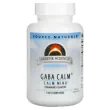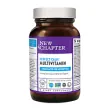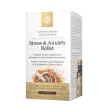Top 7 Natural Remedies for Anxiety Relief

Key Takeaways
Natural remedies for anxiety:- Vitamins and Minerals: Certain nutrients like Vitamin B, Vitamin D, and Magnesium are effective in reducing anxiety symptoms.
- Physical Activity: Regular exercise, such as yoga or jogging, helps decrease stress hormones and anxiety levels.
- Mindfulness and Relaxation: Techniques like meditation, deep breathing, and aromatherapy offer significant anxiety relief.
- Herbal Treatments: Herbal teas and supplements like valerian root and chamomile provide natural anxiety reduction.
Article by Arnie Gitomer Mar 5, 2024
Anxiety is a common condition that affects millions of people worldwide. While it is normal to experience some level of anxiety in response to stressful situations, excessive anxiety can have a negative impact on physical and mental health. Fortunately, there are natural remedies that can help alleviate anxiety symptoms and promote overall well-being. This blog will explore the top 7 natural remedies for anxiety relief, including vitamins shown to assist with anxiety, such as Vitamin B, Vitamin D, and Magnesium. These vitamins have been found to play a crucial role in reducing anxiety levels and promoting a calm state of mind. Additionally, we will explore other natural remedies for anxiety, ranging from exercise and meditation to herbal teas and supplements.
Understanding Anxiety
Before delving into natural remedies, it is essential to understand what anxiety is and how it can affect individuals. Anxiety can be defined as a persistent feeling of fear, worry, or unease. It can manifest as physical symptoms, cognitive distortions, and behavioral changes. Some common symptoms of anxiety include nervousness, excessive worrying, irritability, muscle tension, racing thoughts, and difficulty making decisions. There are various types of anxiety disorders, including generalized anxiety disorder, panic disorder, and social anxiety disorder. Seeking professional help and utilizing natural remedies for anxiety can effectively manage symptoms and improve quality of life.
Defining Anxiety
Anxiety is an umbrella term used to describe a range of mental health conditions characterized by excessive feelings of fear, panic, and worry. Anxiety disorder is a category of mental health conditions that often involve chronic symptoms of anxiety, affecting a person's daily life and well-being. While anxiety is a normal response to stress, chronic anxiety can cause significant distress and impairment in various aspects of life.
Symptoms of anxiety can vary among individuals, but there are several common symptoms associated with anxiety. These symptoms can be physical, cognitive, or behavioral in nature. Physical symptoms of anxiety may include muscle tension, increased heart rate, sweating, gastrointestinal discomfort, and rapid breathing. Cognitive symptoms of anxiety can involve racing thoughts, mental fog, difficulty concentrating, and excessive worry. Behavioral changes, such as social withdrawal, avoiding certain situations, and irritability, are also common in individuals with anxiety.
It is essential to note that anxiety symptoms can differ from person to person, and the severity of symptoms can vary depending on the individual's stress triggers and overall mental health. Recognizing anxiety symptoms and understanding their impact on daily life is the first step toward effective anxiety relief strategies. By identifying these symptoms, individuals can seek appropriate help and implement natural remedies for anxiety to manage it effectively.
Common Symptoms
When experiencing anxiety, individuals may notice a range of physical, cognitive, and behavioral symptoms. Common symptoms of anxiety include:
- Nervousness and excessive worrying
- Muscle tension and restlessness
- Increased heart rate and blood pressure
- Sweating and gastrointestinal discomfort
- Racing thoughts and mental fog
- Difficulty concentrating and making decisions
- Irritability and changes in mood
- Social withdrawal and avoidance of certain situations
- Sleep disturbances, such as insomnia
Anxiety levels can vary from person to person, ranging from mild to severe. Some individuals may experience anxiety in specific situations, while others may have generalized anxiety that persists throughout the day. Understanding the different ways anxiety can manifest is important. It allows individuals to identify appropriate natural remedies for anxiety or other possible relief strategies.
Exercise
Alleviating anxiety symptoms by reducing stress hormone levels, regular physical activity like yoga or running effectively manages feelings of anxiety. Improved sleep quality and lower anxiety levels result from incorporating exercise into daily life, as it promotes the release of endorphins, natural mood-lifting chemicals in the brain. Mental health professionals recommend engaging in physical activity as a natural remedy for anxiety relief.
Reduce Caffeine
While caffeine is commonly consumed to help increase alertness, it can exacerbate anxiety symptoms in some individuals. Caffeine is a stimulant found in coffee, tea, energy drinks, and certain sodas. It stimulates the central nervous system, increasing heart rate, blood pressure, and overall alertness.
For those with anxiety, caffeine intake can cause jitteriness, nervousness, and difficulty sleeping. High caffeine consumption may trigger panic attacks or worsen symptoms of anxiety disorder. Additionally, caffeine can interfere with sleep quality, leading to an increased risk of anxiety symptoms the next day.
Reducing caffeine intake is often recommended as part of anxiety treatment options. While eliminating caffeine may not be necessary, lowering consumption or switching to decaffeinated options can help manage anxiety symptoms. It is essential to be mindful of caffeine intake and observe how it affects anxiety levels individually, as different people may have different sensitivities to caffeine.
Stop Smoking and Drinking
Nicotine and alcohol use can worsen symptoms of anxiety and panic disorders, impacting mental health. Both are stimulants that heighten anxiety. Cutting out smoking and drinking can enhance overall physical health, reducing the risk of heart disease, which can exacerbate anxiety. Substance abuse contributes to anxiety symptoms, necessitating lifestyle changes for anxiety management. Seeking professional help and support groups can aid in smoking and drinking cessation for anxiety relief.
Meditation
Incorporating mindfulness meditation and deep breathing exercises into daily routines can effectively help manage feelings of anxiety. Clinical trials and research support meditation as a natural remedy for anxiety relief. Guided imagery techniques can promote relaxation, aiding in anxiety relief. Mindfulness meditation helps calm the stress response in the body, offering a holistic approach to anxiety management. Embracing different ways of meditation, such as guided imagery and deep breathing exercises, can complement traditional treatment methods for anxiety.
Journaling
Understanding and managing anxiety can be effectively aided by the practice of journaling. Regularly writing down anxious thoughts helps individuals process and identify triggers, enabling better management. It allows tracking of progress in overcoming symptoms and is a recommended tool by mental health professionals for anxiety relief. Journaling, as a systematic review shows, is a beneficial practice that aligns with cognitive behavioral therapy for anxiety management.
Aromatherapy
Incorporating aromatherapy into daily routines can support natural anxiety relief by utilizing essential oils like lavender and chamomile to induce calming effects. Inhalation of these oils has been shown to reduce anxiety levels and enhance sleep quality, making it a widely recognized complementary treatment. Aromatherapy can be easily integrated into daily life through diffusers, inhalers, or simply by adding a few drops of essential oil to a warm bath, providing a soothing and relaxing experience.
Herbal Teas & Supplements
Integrating herbal teas and supplements into daily routines can complement anxiety treatment. Valerian root and passionflower are known for their anxiety-relieving properties, while magnesium and lemon balm are associated with anxiety relief. Herbal supplements offer a natural way to manage anxiety symptoms, while chamomile tea promotes relaxation and helps reduce feelings of anxiety. The use of herbal teas and supplements, in combination with other techniques, forms a holistic approach to anxiety management.
Are Natural Remedies for Anxiety Sufficient for Managing it?
Natural remedies for anxiety can be beneficial for managing mild to moderate symptoms. However, it is essential to recognize that every individual's experience with anxiety is unique, and some may require additional support. While natural remedies like exercise, meditation, journaling, and herbal remedies can provide relief, severe anxiety or anxiety that significantly impacts daily life may require professional help.
When to Seek Professional Help
While natural remedies for anxiety can help alleviate symptoms for many individuals, it is crucial to seek professional help if anxiety is interfering with daily life or causing significant distress.
Professional help can involve therapy, medication, or a combination of both, depending on the severity of anxiety symptoms. Mental health professionals can provide a proper diagnosis, recommend appropriate treatment options, and monitor progress over time. Prescription medication, such as selective serotonin reuptake inhibitors (SSRIs), benzodiazepines, or beta-blockers, may be prescribed in some cases.
Cognitive behavioral therapy (CBT) is a common therapy approach used to treat anxiety disorders. CBT focuses on identifying and changing negative thought patterns and behaviors that contribute to anxiety. Through talk therapy, individuals can develop effective coping mechanisms, learn relaxation techniques, and gain a better understanding of their anxiety triggers.
It is important to remember that professional help should be sought if anxiety symptoms are accompanied by suicidal or harmful thoughts. Mental health professionals are trained to provide support and guidance during times of crisis, offering essential help and resources.
Recognizing the Need for Help Beyond Natural Remedies for Anxiety
Recognizing the need for help is crucial for individuals who experience serious anxiety symptoms or whose anxiety significantly impacts their daily lives. When anxiety symptoms interfere with daily activities, relationships, work, and overall quality of life, seeking professional help is essential.
Recognizing the need for help involves acknowledging the severity of anxiety symptoms and understanding that anxiety is a legitimate mental health condition. It may be challenging to reach out for help due to stigma or a fear of judgment, but it is important to prioritize mental health over any perceived barriers.
In some cases, anxiety symptoms may be indicative of underlying health conditions, such as thyroid disorders or chronic anxiety disorders, which require medical intervention. Recognizing these connections between physical and mental health can help individuals make informed decisions about seeking professional help.
Chronic anxiety, characterized by long-term anxiety symptoms, often requires ongoing professional support. Chronic anxiety can significantly impact overall well-being, making it important to address symptoms through therapy, medication, or alternative treatments.
Recognizing the need for help is an essential step in managing symptoms of anxiety effectively. By reaching out to mental health professionals, individuals can access the resources, support, and treatment options necessary for their unique journey toward anxiety relief and mental well-being.
Conclusion
It's important to remember that anxiety is a complex condition that requires a holistic approach to treatment. While natural remedies for anxiety can provide relief for some individuals, they may not be sufficient for everyone. If your anxiety symptoms are severely impacting your daily life and functioning, it's crucial to seek professional help.
A mental health professional can provide a comprehensive evaluation, diagnosis, and personalized treatment plan tailored to your specific needs. Remember, you are not alone in your journey towards anxiety relief. Reach out for support, prioritize self-care, and explore the various options available to you. It's important to take a proactive and collaborative approach to managing anxiety, and with the right support, resources, and strategies, you can overcome this challenge and live a fulfilling life.
 |
Read more about Arnie Gitomer |
Product Search Results

|
Anxiety Complex | Willner Phyto Tech | $10.92 | 57014 |

|
Gaba Calm Sub Orange | Source Naturals | $9.79 | 26215 |

|
Nerve Calmplex | Willner Phyto Tech | $10.57 | 56984 |

|
Perfect Calm | New Chapter | $63.67 | 59551 |

|
Stress & Anxiety Relief | Solgar | $23.99 | 70311 |
